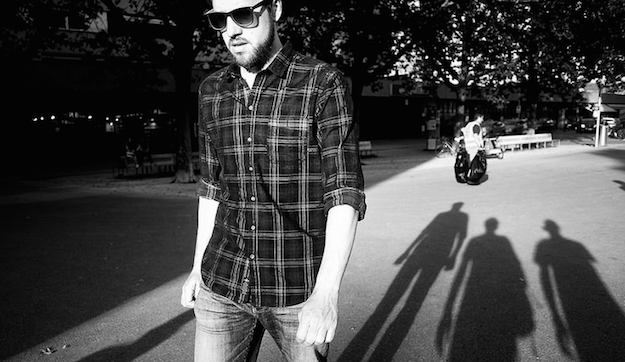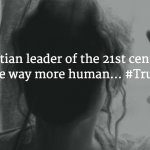Recently, I had the opportunity to teach a seminar at the Christ and Cascadia Conference in Seattle, Washington, entitled, “Ghost Town: Spirit and Church in an Individualistic World.” I was delighted to find a seminar room packed with eager scholars, pastors, and Christians desiring to think through what living the gospel in the city entails.
I feel I have something to say about this. Not a final word, but something. As a pastor in the urban core of Portland, I’ve been given a privileged place to creepily watch my neighborhood for trends and insights as to emerging beliefs and faith. In my seminar, I decided to share a few of these insights. To do so, I needed a fictional character. Years ago, I’d heard that Rick Warren created a fictional character named “Saddleback Sam” who epitomized the kind of individual Saddleback Church sought to engage in Southern California. I, on the other hand, came up with “Cascadian Carl” as the fictional name for a young, non-Christian, progressive, postmodern person who lives in an urban center of a post-Christian city like Portland.
Cascadian Carl, I began, believes in absolute truth and is not a relativist.
Let me unpack. Truth, in the postmodern (or “late modernism” if you like) world, is said to be fundamentally local, contextual, and subjective. This philosophical complexity is consistently boiled down into a widely quoted cultural cliché few of us have been able to escape: “what I believe is what I believe, what you believe is what you believe.” Within these constructs, truth, morality, and ethical values are viewed largely as self-created within either an individual, or, a given culture appearing differently from community to community. The latent epistemological by-product of this, as it were, is that religious truths are inherently cultural and subjective, never universal and objective.
For the postmodern, truth and morality change from zip code to zip code.
At least that was what we were taught. Long-ago, I was instructed by my pedagogical forbears that the postmodern world was one that would be increasingly intolerant and inhospitable to any idea (such as the gospel) deemed as timeless, universal, objective, and transcending place and culture. Postmodernism was caricatured as being opposed to any universalized, absolutized truth.
But that caricature was just plain wrong. Postmodernism, I’ve come to believe, does believe in timeless, universal, and objective truth in a similar that Christians believe in truth. In fact, what is becoming late-late modernism (or, as I call it, “mid-life crisis modernism”) and the Christian message share one fundamental point in common.
Both wholeheartedly believe in absolute truth.
Don’t think so? Bring up Monsanto, bullying, or marriage equality with Cascadian Carl and you’ll immediately see what I’m talking about. Everyone believes in absolute truth once these conversations arise; everyone believes in some set of universal truths that transcend time, culture, and context. Now, indeed, postmodernism holds to a selective set of absolute truths that can be at odds with Christianity. Largely, the sole remaining moral absolutes in Western culture are those pertaining to traditionally marginalized, oppressed people groups. And, I should say, this is the good contribution of postmodernism if there ever was one. Traditionally ostracized and marginalized peoples are redemptively reminded of their value, voice, and validity. I applaud Foucault and Sartre and the other postmodern fathers and mothers for this. Of course, they wouldn’t put it this way, but they saw something of God’s grace. For in God’s creation, every human being has intrinsic value to God, even if they’re fundamentally wrong in their beliefs or convictions.
The gospel proclaims that a voice isn’t valuable if it’s right. A voice is valuable because it’s a voice created and loved by a Creator.
But that isn’t to let postmodernism off the hook for its blatant arrogance and hubris. How can I assert that? Postmodernism hypocritically seeks to accomplish two moves at the same time. It seeks to dethrone religious truths as “local, contextual, and subjective” while simultaneously enforcing upon the world its own set of “timeless, universal, and objective” truths. But isn’t that a bit, well, unfair. And, boy, isn’t…it…awkward.
An example of what I’m talking about took place during the Olympics in Sochi, Russia. We all watched as the global community came down (rightfully so) on the Russian government for their oppressive dehumanization of the LGBTI community. In protest, a number of athletes refused to compete. So, I admit, it was interesting to observe my secular, progressive, non-Christian friends—all my Cascadian Carl’s—engage in the discussion with anger and passion (again, legitimate anger and passion). I was confused. Again, I always assumed that a Cascadian Carl wouldn’t hold to universal, transcultural version of truth. I assumed he wouldn’t believe their own morality should rule in such far away places like Russia. But he did. Here he was, Cascadian Carl, arguing for a moral truth, which he believed transcended oceans, cultures, and times. Cascadian Carl, who long had been telling me that truth was relative and contextual, was so quickly holding other cultures and peoples to his own sensible version of the truth.
Of course, if Cascadian Carl didn’t actually believe in objective truth, he wouldn’t have given a fuss for a moment about what was taking place in Russia of all places. Because, well, it’s their culture, their beliefs, their truths. But he did put up a fight. And he should have.
What they believe, they believe; what we believe, we believe, doesn’t hold up for anyone. It never has. We all hold others to account for our versions of truth.
—
Stay tuned for part 2 tomorrow! [Image by Zuerichs Strassen, CC via Flickr]






Missio Alliance Comment Policy
The Missio Alliance Writing Collectives exist as a ministry of writing to resource theological practitioners for mission. From our Leading Voices to our regular Writing Team and those invited to publish with us as Community Voices, we are creating a space for thoughtful engagement of critical issues and questions facing the North American Church in God’s mission. This sort of thoughtful engagement is something that we seek to engender not only in our publishing, but in conversations that unfold as a result in the comment section of our articles.
Unfortunately, because of the relational distance introduced by online communication, “thoughtful engagement” and “comment sections” seldom go hand in hand. At the same time, censorship of comments by those who disagree with points made by authors, whose anger or limited perspective taints their words, or who simply feel the need to express their own opinion on a topic without any meaningful engagement with the article or comment in question can mask an important window into the true state of Christian discourse. As such, Missio Alliance sets forth the following suggestions for those who wish to engage in conversation around our writing:
1. Seek to understand the author’s intent.
If you disagree with something the an author said, consider framing your response as, “I hear you as saying _________. Am I understanding you correctly? If so, here’s why I disagree. _____________.
2. Seek to make your own voice heard.
We deeply desire and value the voice and perspective of our readers. However you may react to an article we publish or a fellow commenter, we encourage you to set forth that reaction is the most constructive way possible. Use your voice and perspective to move conversation forward rather than shut it down.
3. Share your story.
One of our favorite tenants is that “an enemy is someone whose story we haven’t heard.” Very often disagreements and rants are the result of people talking past rather than to one another. Everyone’s perspective is intimately bound up with their own stories – their contexts and experiences. We encourage you to couch your comments in whatever aspect of your own story might help others understand where you are coming from.
In view of those suggestions for shaping conversation on our site and in an effort to curate a hospitable space of open conversation, Missio Alliance may delete comments and/or ban users who show no regard for constructive engagement, especially those whose comments are easily construed as trolling, threatening, or abusive.